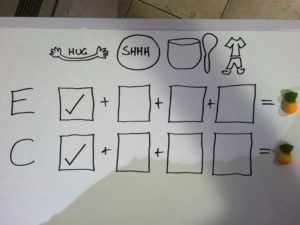Mornings are war at my house. My two boys, 3 & 5, love to yell and scream and throw toys, they hate eating breakfast, and dressing them is akin to going 15 rounds of Greco-Roman wrestling. There are days I leave the house on the verge of tears.
I realised recently I am struggling with a similar issue most companies face with their customers; a lack of engagement with ‘the program’. Fortunately, being human children, they respond to psychological stimulators in exactly the same way as adults. So I’ve designed them a gamified reward program to guide their behaviour towards a more positive outcome.
Both of them win a small treat each day by earning a tick in each box. To earn the tick they must:
- Give me & my wife a hug
- Be quiet
- Eat their breakfast
- Get dressed
I’ve made it pictorial so they can easily understand the requirements and measure their progress.
The results have been astounding. After less than two weeks our mornings have been transformed from Saving Private Ryan to The Sound Of Music. The kids are enthusiastic about participating, and have started competing with each other to see who gets their four ticks first. Life is now unbridled joy. Hey, gamification really does work!
Some of the psychology I’ve used to underpin the design (drawn directly from an article by David Feldman) includes:
- Goal Attainment (Dreze): Participants who successfully attained a reward exhibit increased effort and drive in subsequent attempts to reach a goal. Now that my kids understand how the program works, and that they stand a good chance of earning their treat, they’re putting in more effort each morning to ensure they succeed.
- Endowed Progress Effect (Dreze and Nunes): The perception of progress toward a goal induces additional effort to reach the goal. The first tick is easy to achieve (a hug) which makes them feel instantly like they’re on the path to earning their reward, so they keep going.
- Customer Delight Model (Oliver, Rust & Varki): Positive surprise & delight experiences elicit pleasure, joy and elation, and lead to an increased desire for future recurrences of this sensation. To keep it interesting I mix up the reward; sometimes it’s a lolly, sometimes chocolate, and sometimes a tiny toy. This keeps it interesting as they wake up each morning wondering what they can win
It may sound simple, but it’s been hugely effective. God, I love my kids.
Philip Shelper is a specialist loyalty consultant based in Sydney, Australia who obsesses about everything to do with loyalty and rewards. His company Loyalty & Reward Co are a leading loyalty consulting firm.
Let’s connect! https://au.linkedin.com/in/philipshelper


